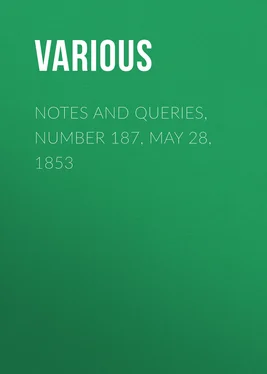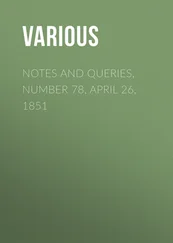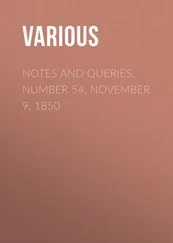Various - Notes and Queries, Number 187, May 28, 1853
Здесь есть возможность читать онлайн «Various - Notes and Queries, Number 187, May 28, 1853» — ознакомительный отрывок электронной книги совершенно бесплатно, а после прочтения отрывка купить полную версию. В некоторых случаях можно слушать аудио, скачать через торрент в формате fb2 и присутствует краткое содержание. Жанр: foreign_antique, periodic, foreign_edu, на английском языке. Описание произведения, (предисловие) а так же отзывы посетителей доступны на портале библиотеки ЛибКат.
- Название:Notes and Queries, Number 187, May 28, 1853
- Автор:
- Жанр:
- Год:неизвестен
- ISBN:нет данных
- Рейтинг книги:5 / 5. Голосов: 1
-
Избранное:Добавить в избранное
- Отзывы:
-
Ваша оценка:
- 100
- 1
- 2
- 3
- 4
- 5
Notes and Queries, Number 187, May 28, 1853: краткое содержание, описание и аннотация
Предлагаем к чтению аннотацию, описание, краткое содержание или предисловие (зависит от того, что написал сам автор книги «Notes and Queries, Number 187, May 28, 1853»). Если вы не нашли необходимую информацию о книге — напишите в комментариях, мы постараемся отыскать её.
Notes and Queries, Number 187, May 28, 1853 — читать онлайн ознакомительный отрывок
Ниже представлен текст книги, разбитый по страницам. Система сохранения места последней прочитанной страницы, позволяет с удобством читать онлайн бесплатно книгу «Notes and Queries, Number 187, May 28, 1853», без необходимости каждый раз заново искать на чём Вы остановились. Поставьте закладку, и сможете в любой момент перейти на страницу, на которой закончили чтение.
Интервал:
Закладка:
Various
Notes and Queries, Number 187, May 28, 1853 / A Medium of Inter-communication for Literary Men, Artists, Antiquaries, Genealogists, etc
Notes
ON CHAUCER'S KNOWLEDGE OF ITALIAN
In the Memoir prefixed to the Aldine edition of the Poetical Works of Chaucer , London, 1845, Sir Harris Nicolas expresses an opinion that Dan Geoffrey was not acquainted with the Italian language, and therefore not versed in Italian literature.
"Though Chaucer undoubtedly knew Latin and French, it is by no means certain, notwithstanding his supposed obligations to the Decameron, that he was as well acquainted with Italian. There may have been a common Latin original of the main incidents of many, if not of all the tales, for which Chaucer is supposed to have been wholly indebted to Boccaccio, and from which originals Boccaccio himself may have taken them. That Chaucer was not acquainted with Italian may be inferred from his not having introduced any Italian quotation into his works, redundant as they are with Latin and French words and phrases."— Life of Chaucer , pp. 24, 25.
To which the following note is subjoined:
"Though Chaucer's writings have not been examined for the purpose, the remark in the text is not made altogether from recollection, for at the end of Speght's edition of Chaucer's Works , translations are given of the Latin and French words in the poems, but not a single Italian word is mentioned."
If Sir Harris Nicolas had examined the writings of Chaucer with any care, he would scarcely have formed or expressed so strange an opinion, for he must necessarily have discovered that Chaucer was not only well acquainted with the language, but thoroughly well versed in Italian literature, and that he paraphrased and translated freely from the works of Dante, Petrarca, and Boccaccio. Chaucer would naturally quote Latin and French, as being familiar to his cotemporaries, and would abstain from introducing Italian, as a knowledge of that language must have been confined to a few individuals in his day; and he wrote for the many, and not for the minority.
The circumstances of Chaucer's life, his missions to Italy, during which he resided several months in that country, when sent on the king's business to Genoa, and Florence, and Lombardy, afforded him ample opportunities of becoming thoroughly acquainted with the language and literature of Italy; the acquisition of which must have been of easy accomplishment to Chaucer, already familiar with Latin and French. So that it is not necessary to endow Chaucer "with all human attainments as proof of his having spoken Italian."
Chaucer's own writings, however, afford the strongest evidence against the opinion entertained by Sir Harris Nicolas, and such evidence as cannot be controverted.
Chaucer loves to refer to Dante, and often translates passages from the Divine Comedy . The following lines are very closely rendered from the Paradiso , xiv. 28.:—
"Thou one, two, and thre, eterne on live,
That raignest aie in thre, two, and one,
Uncircumscript, and all maist circumscrive."
" Quell' uno e due e tre che sempre vive,
E regna sempre in tre e due ed uno ,
Non circonscritto, e tutto circonscrive. "
"Wel can the wise poet of Florence ,
That highte Dant , speken of this sentence:
Lo, in swiche maner rime is Dantes tale.
Ful selde up riseth by his branches smale
Prowesse of man, for God of his goodnesse
Wol that we claime of him our gentillesse. "
" Rade volte risurge per li rami
L' umana probità: e questo vuole
Quei che la dà, perchè da lui si chiami. "
After relating the dread story of the Conte Ugolino, Chaucer refers to Dante, from whom perhaps he derived it. (Conf. Inferno , xxxiii.)
"Who so wol here it in a longer wise,
Redeth the grete poete of Itaille,
That highte Dante , for he can it devise
Fro point to point, not o word wol he faille."
"Bet than Vergile, while he was on live,
Or Dant also."— The Freres Tale , 7101.
The following lines refer to the Inferno , xiii. 64.:
"Envie is lavender of the court alway,
For she ne parteth neither night ne day,
Out of the house of Cesar, thus saith Dant ."
" Dant that it tellen can" is mentioned in the House of Fame , book i.; and Chaucer is indebted to him for some lines in that fine poem, as in the description of the "egle, that with feathers shone all of gold" = un' aquila nel ciel con penne d'oro ; and the following line:
"O thought, that wrote all that I met."
" O mente, che scrivesti ciò ch' io vidi. "
The Knightes Tale exhibits numerous passages, lines, and expressions verbally translated from the Teseide of Boccaccio, upon which it is founded; such as Idio armipotente = Mars armipotent; Eterno admante = Athamant eterne; Paura palida = pale drede; Le ire rosse come focho = the cruel ire red as any glede. Boccaccio describes the wood in which "Mars hath his sovereine mansion" as—
" Una selva sterile de robusti
Cerri,
Nodosi aspri e rigidi e vetusti.
Vi si sentia grandissimo romore,
Ne vera bestia anchora ne pastore. "
There is a purposed grisly ruggedness in the corresponding passage of the Knightes Tale , which heightens the horrors of "thilke colde and frosty region:"
"First on the wall was peinted a forest,
In which ther wonneth neyther man ne best,
With knotty knarry barrein trees old
Of stubbes sharpe and hidous to behold ;
In which ther ran a romble and a swough ,
As though a storme shuld bresten every bough."
The death of Arcite is thus related by Boccaccio:
"La morte in ciascun membro era venuta
Da piedi in su, venendo verso il petto,
Ed ancor nelle braccia era perduta
La vital forza; sol nello intelletto
E nel cuore era ancora sostenuta
La poca vita, ma già si ristretto
Eragli 'l tristo cor del mortal gelo
Che agli occhi fe' subitamente velo.
"Ma po' ch' egli ebbe perduto il vedere,
Con seco cominciò a mormorare,
Ognor mancando più del suo podere:
Nè troppo fece in ciò lungo durare;
Ma il mormorare trasportato in vere
Parole, con assai basso parlare
Addio Emilia; e più oltre non disse,
Chè l' anima convenne si partisse."
Chaucer loses nothing of this description in his condensed translation:
"For from his feet up to his brest was come
The cold of deth, that had him overnome.
And yet moreover in his armes two
The vital strength is lost, and all ago.
Only the intellect, withouten more,
That dwelled in his herte sike and sore,
Gan feillen, when the herte felte deth;
Dusked his eyen two, and failled his breth.
But on his ladie yet cast he his eye;
His laste word was; Mercy, Emelie!"
Интервал:
Закладка:
Похожие книги на «Notes and Queries, Number 187, May 28, 1853»
Представляем Вашему вниманию похожие книги на «Notes and Queries, Number 187, May 28, 1853» списком для выбора. Мы отобрали схожую по названию и смыслу литературу в надежде предоставить читателям больше вариантов отыскать новые, интересные, ещё непрочитанные произведения.
Обсуждение, отзывы о книге «Notes and Queries, Number 187, May 28, 1853» и просто собственные мнения читателей. Оставьте ваши комментарии, напишите, что Вы думаете о произведении, его смысле или главных героях. Укажите что конкретно понравилось, а что нет, и почему Вы так считаете.












